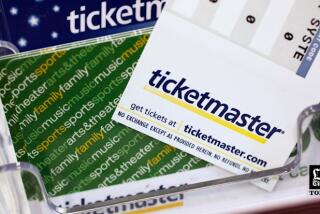The Fine Art of âPapering the Houseâ : Free Tickets Sometimes Offered When Performer Canât Fill the Venue
As a longtime Julie Andrews fan, Los Angeles accountant Nina Stein headed straight for the box office when tickets went on sale to the veteran performerâs recent two-night stand at the Greek Theatre. Stein, 42, paid $156 for four choice seats.
After the concert, she and her three friends went to Canterâs Deli in the Fairfax District for a late-night nosh. To her surprise--and dismay--she saw a stack of vouchers by the cash register, each one good for four free tickets to either of Andrewsâ shows.
Steinâs first thought: Why had she just paid $156 for what others could see for free?
âIf Julie Andrews canât sell (enough) tickets to her comeback concert, maybe she shouldnât play such a large venue,â Stein said in a letter to The Times. âShe certainly shouldnât insult the fans she has left by making them feel like suckers.â
In a subsequent phone interview, Stein was still steamed: âHere I am the stupid one who gets stuck spending over $100 and everyone else was walking in free.â
Well, not everyone else, but a significant number. Susan Rosenbluth, general manager of the 6,200-seat Greek Theatre, said that about 700 tickets were given away each night.
And this was hardly an isolated incident.
A Calendar survey of booking agents and personal managers suggests that the practice of distributing free concert tickets in an effort to fill empty seats--âpapering the house,â as itâs called in the industry--is common. Industry insiders estimated that at least some papering goes on at 10% to 40% of all shows across the country.
Papering is especially prevalent in the media centers of Los Angeles and New York, where a high premium is placed on maintaining the image of success.
Phil Casey, vice president at the ICM talent agency in Beverly Hills, said: âIf youâre playing Cedar Rapids, Iowa, and youâve got three-quarters of a house filled, youâre not going to worry about it, but if youâre playing the Forum (in Inglewood), you want to fill it up. You want to give the impression that youâre successful in the major media markets. Thereâs nothing worse than a review coming out saying so-and-so played to half a house, so you try and find a way of putting more people in there and filling it up a little bit.â
But Casey said itâs usually done more âtactfullyâ than it was in the Andrews episode: âYou try to do it as discreetly as possible so that it doesnât look like youâre flooding the city with tickets.â
An Andrews associate, who requested anonymity, said that âthose who did get in for free were sitting in the back of the theater to make it look nicer so Julie would feel comfortable when she walked out on stage.â
The associate added that whoever put the vouchers on the counter at Canterâs âwasnât the person who was authorized to paper a limited amount of seats for the Greek Theatre. The theater may have given them to somebody whoâs involved in a charity or an organization, who decided like a jerk to leave them at Canterâs.â
Papering the house--which does not include the routine practices of giving away a limited number of promotional tickets for radio station giveaways and a limited number of complimentary tickets to members of the media and the industry--is a sensitive subject in the concert business. Everybody does it from time to time, but nobody likes to talk about it.
âItâs very embarrassing for both the artist and the venue,â said Dick Alen, head of the music department at the William Morris Agency.
One reason for their reticence is that papering is one of the tricks of the trade to give the illusion of success. Many in the concert industry would prefer that audiences didnât realize that thereâs sometimes a difference between appearance and reality, that one canât simply look at the size of the audience as an accurate gauge of a performerâs drawing power.
But no one denies that papering is a common practice.
âItâs done all the time,â said Ron DeBlasio, a manager who has worked with such artists as Donna Summer and the rock group X. âThere usually are seats remaining that arenât particularly good that nobody wants.â
DeBlasio, a former William Morris agent, added that this is especially true with performers such as Andrews, whose appeal is to an upper-demographic, middle-of-the-road audience.
âThat audience tends to buy high-scale tickets,â he said. âThey probably wouldnât buy cheap tickets way up on top or way over on the side. So those tickets are available.â
Papering the house is usually carried out during the 48 hours before a show.
Rob Kahane, who co-manages George Michael and was formerly a booking agent, said, âItâs always just the last couple of days when you know itâs going to look like a disaster and you want to save face.â
The key to successful papering is distributing the tickets to people who will use them. âYou can get tickets out easily enough,â said ICMâs Casey. âYou can rent an airplane and drop them out over the city, but thatâs not the purpose. You want to get them to people who you know are going to want to go to the show and who are going to be grateful for getting the tickets.â
The best way to do that, sources agree, is to give tickets to people who donât normally have the opportunity--or the money--to attend concerts.
âItâs normally done on an organizational basis, usually through charity,â said Rosenbluth of the Greek Theatre. âThere are a whole bunch of them we deal with: BâNai Brith Women, Youth for Christ, halfway houses, abused-womenâs shelters, county facilities for teen-agers. We just have somebody in the office pull the charity list and start making phone calls.â
The theater owners like to give tickets to charities for another reason: The people those organizations service arenât the theatersâ regular customers.
âYouâre not taking tickets out of the marketplace that way,â DeBlasio said. âIf you give them to the patrons at a restaurant or a shop, they may have bought tickets anyway.â
DeBlasio said that he considers papering a good business practice. In most cases, no one has to pay for the papered tickets, the face value of which is not included in the box-office grosses reported to trade publications.
âItâs a form of promotion,â he said. âThe venue is sitting there anyway, so if they give out free tickets, theyâre going to get some money back on parking and on refreshments. They may be giving them to charitable organizations, but that doesnât necessarily mean that everybody in the organization is penniless. And by papering you may drum up word-of-mouth on the act and expose a patron who may be become a repeat customer.â
So why donât promoters paper every show that fails to sell out?
Alen of the Morris Agency said that promoters donât want audiences to become conditioned to getting free tickets.
âThe promoter wants the house to be full, but he doesnât want the audience to think that they can get in for nothing,â he said. âIf an audience learns that, then theyâll keep on waiting next time.â
Rosenbluth, who said that the Greek papers just three or four shows a year out of 80 concerts, added: âThe ticket is your only product. Itâs the only thing you can assign value to.â
Rosenbluth said that she prefers discounting as an alternative to papering. She noted that many theaters offer twofers, coupons that allow a customer to buy two tickets for the price of one on shows that arenât sell-outs.
But she acknowledged that there would be tremendous resistance to enacting a similar system for selling concert tickets.
âMost managers wouldnât want you to take an ad discounting their artistâs tickets because of the importance of image in this city and the nature of our business,â she said. âWith the record and movie industries based here, image is more important here than in any city except New York.â
ONE THEY DIDNâT PAPER
Leonard Feather reviews the Blue Note Records celebration at Ford Theatre. Page 5.
More to Read
The biggest entertainment stories
Get our big stories about Hollywood, film, television, music, arts, culture and more right in your inbox as soon as they publish.
You may occasionally receive promotional content from the Los Angeles Times.










